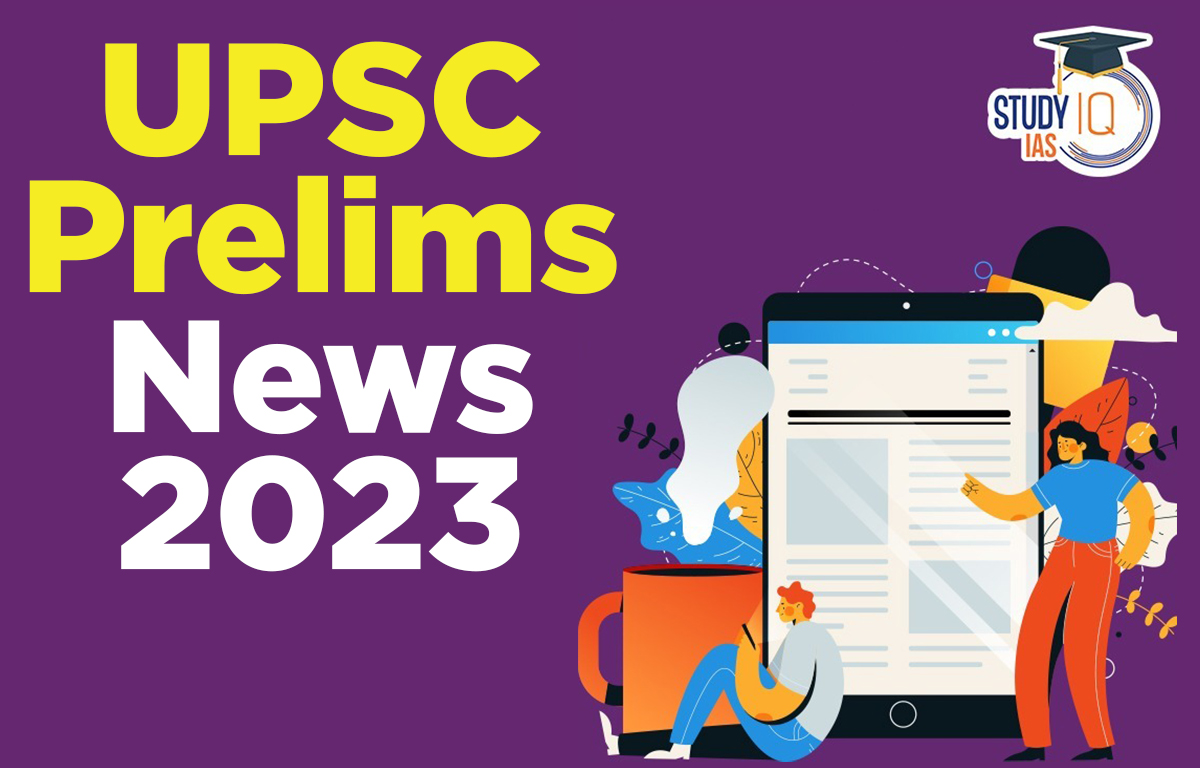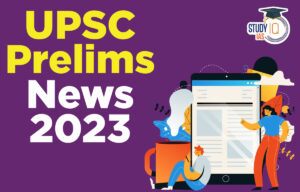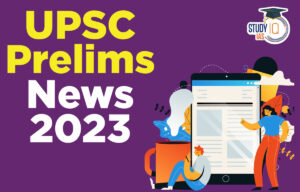UPSC Prelims News of 13 February 2023
Global Biofuel Alliance
Context: Global Biofuel Alliance was announced by Minister of Petroleum & Natural Gas during India Energy Week 2023.
About Global Biofuel Alliance
- The Global Biofuel Alliance is one of the priorities under India’s G20 Presidency. It will include Brazil, India, and the United States, working towards development of a Global Biofuels Alliance.
- This alliance will be aimed at facilitating cooperation and intensifying the use of sustainable biofuels, including in the transportation sector.
- Objectives: The focus of the alliance will be on strengthening markets, facilitating global biofuels trade, development of concrete policy lesson-sharing and provision of technical support for national biofuels programs worldwide
- The Alliance will work in collaboration with and complement the relevant existing regional and international agencies as well as initiatives in the bio-energy, bio-economy, and energy transition fields.
UPSC Prelims News 11 February 2023
Indo-Pacific Economic Framework (IPEF)
Context: India has started hosting a four-day long ministerial special negotiations session of the Indo-Pacific Economic Framework (IPEF).
About IPEF
- IPEF is a US-led initiative that aims to strengthen economic partnerships among participating countries to enhance resilience, sustainability, inclusiveness, economic growth, fairness, and competitiveness in the Indo-Pacific region.
- It was launched in 2021 with a dozen initial partners who together represent 40% of the world GDP.
- The IPEF allows members to negotiate on trade but it is not a free trade agreement. The negotiations will be along four main “pillars”.
- Supply-chain resilience
- Clean energy, decarbonization & infrastructure
- Taxation & anti-corruption
- Fair & resilient trade.
- Currently, Australia, Brunei, Fiji, India, Indonesia, Japan, South Korea, Malaysia, New Zealand, Philippines, Singapore, Thailand, United States, and Vietnam are members of IPEF.
- India Agenda: First and foremost, supply chain resilience has come to be the key issue for India’s interlocutors at IPEF deliberations.
Study Webs of Active Learning for Young Aspiring Minds (SWAYAM)
Context: The government-run SWAYAM platform outperforms other e-learning platforms and records over 3 crore enrollments.
About SWAYAM
- SWAYAM is a program initiated by the Government of India and designed to achieve the three cardinal principles of Education Policy viz., access, equity, and quality.
- The objective of this effort is to take the best teaching and learning resources to all, including the most disadvantaged.
- It seeks to bridge the digital divide for students who have hitherto remained untouched by the digital revolution and have not been able to join the mainstream of the knowledge economy.
- It is developed by the Ministry of Education and AICTE with the tie-up with Microsoft and provides over 2000 courses and over 80000 hours of learning for the students.
- SWAYAM follows the concept of MOOCs (Massive Open Online Courses) which is a concept of providing online courses to a wide section of people over a platform of learning and e-education.
MicroLED Displays
Context: Apple’s shift to MicroLED display technology is reportedly under process and is considered as the next big transition in display technology.
About MicroLEDs
- MicroLEDs are self-illuminating diodes that have brighter and better colour reproduction than Organic Light Emitting Diode (OLED) display technology.
- The basis of MicroLED technology is sapphires. A sapphire can shine on its own forever.
- A microLED screen is filled with such small but strong light. The picture in a MicroLED screen is generated by several individual light-emitting diodes.
Benefits of MicroLEDs
- MicroLED displays are brighter, have better colour reproduction, and provide better viewing angles.
- Images appear as painted on top of the device’s glass and are quite a technological feat.
- MicroLEDs have limitless scalability, as they are resolution-free, bezel-free, ratio-free, and even size-free.
- The screen can be freely resized in any form for practical usage.
- MicroLEDs are self-emissive and also individually produce red, green, and blue colours without needing the same backlighting or colour filters as conventional displays.
DHARA 2023
Context: Driving Holistic Action for Urban Rivers (DHARA), the annual meeting of the members of the River Cities Alliance is being organized.
About DHARA 2023
- It is being organized by the National Mission for Clean Ganga (NMCG) in association with National Institute of Urban Affairs (NIUA) from 13th to 14th February 2023 in Pune.
- DHARA 2023 is being organised for the Municipal Commissioners of the member cities to initiate in-depth discussions and come up with possible learning solutions for urban river management.
- Outcomes: Expected outcome includes development of a compendium of technological solutions that cities may adopt for enhancing management of local rivers.
- DHARA has strong synergies with Urban20 initiative under ambit of India’s G20 Presidency.
- There will also be a session with the young people ‘Youth for Rivers’ to provide an opportunity to students from different disciplines to present their ideas for management of urban rivers.
River Cities Alliance (RCA)
- River Cities Alliance started with 30 cities in 2021 and currently has 95 cities as members across India.
- RCA was launched in 2021 as a dedicated platform for river cities across India to discuss & exchange information for sustainable management of urban rivers.
- River Cities Alliance, first-of-its-kind Alliance in the world, symbolizes the successful partnership of the two Ministries i.e., Ministry of Jal Shakti and Ministry of Housing and Urban Affairs.
- The Alliance focuses on three broad themes- Networking, Capacity Building and Technical Support.
SSLV-D2 Rocket
Context: ISRO’s SSLV-D2 rocket has successfully placed three satellites into the intended orbit.
More on the News:
The payloads included ISRO’s EOS-07, US-based firm Antaris’ Janus-1 and Chennai-based space start up SpaceKidz’s AzaadiSAT-2.
The SSLV rocket
- The Small Satellite Launch Vehicle (SSLV) caters to the launch of up to 500 kg satellites to low earth orbits on ‘launch-on-demand‘ basis.
- SSLV is configured with three solid propulsion stages and a velocity terminal module.
- It aims to capture the emerging small and microsatellite commercial market.
- Benefits
- Low-cost access to space
- Low turn-around time
- Flexibility in accommodating multiple satellites
- Minimal launch infrastructure needed
- Launch on demand
Maharishi Dayanand Saraswati
Context: The 200th birth anniversary of Swami Dayanand Saraswati has been observed recently.
About Swami Dayanand
- Swami Dayanand Saraswati was a Hindu spiritual leader and social reformer who lived in India during the 19th century.
- He was born on February 12, 1824, in the town of Tankara in the state of Gujarat.
- Contributions:
- He was the founder of the Arya Samaj, a Hindu reform organization that was established in 1875.
- His teachings were rooted in the Vedas and he aimed to promote the principles of truth, morality, and unity among Hindus.
- He advocated for the rejection of blind faith and superstition, and instead encouraged people to seek knowledge and understanding through reason and observation.
- He also worked towards the upliftment of women and sought to eliminate social evils such as caste discrimination and idol worship.
- The DAV (Dayanand Anglo Vedic) schools came into existence in 1886 to realize the vision of Swami Dayanand Saraswati.
- Dayananda’s views were published in his famous work, Satyarth Prakash (The True Exposition).
- He passed away on October 30, 1883.
Delhi Mumbai Expressway
Context: The Prime Minister dedicated the 246 km Delhi – Dausa – Lalsot section of the Delhi Mumbai Expressway recently.
About the Expressway:
- The Delhi-Mumbai Expressway is a proposed expressway in India that aims to connect the two cities of Delhi and Mumbai.
- It is expected to reduce the travel time between the two cities to around 12 hours, compared to the current travel time of more than 20 hours.
- The proposed expressway will pass through the states of Haryana, Rajasthan, Gujarat, and Maharashtra, and is expected to have a total length of approximately 1,450 km.
Significance:
- Reduced travel time: The expressway is expected to significantly reduce the travel time between Delhi and Mumbai.
- Improved Connectivity: The expressway would improve the connectivity between two of India’s largest cities, promoting trade and commerce between the regions and fostering economic growth.
- Job creation: The construction of the expressway is expected to generate employment opportunities, both directly and indirectly, in the construction and related industries.
- Improved road infrastructure: The expressway would provide a modern and well-maintained road infrastructure, which would make it easier for goods to be transported between the two cities reducing the cost of transportation and increasing efficiency.
- Boost to tourism: The reduced travel time and improved road infrastructure are expected to boost tourism in the regions along the expressway, leading to economic growth and job creation in the hospitality and tourism sectors.


 UPSC Prelims News 20 March 2023
UPSC Prelims News 20 March 2023
 UPSC Prelims News 17 March 2023
UPSC Prelims News 17 March 2023





















